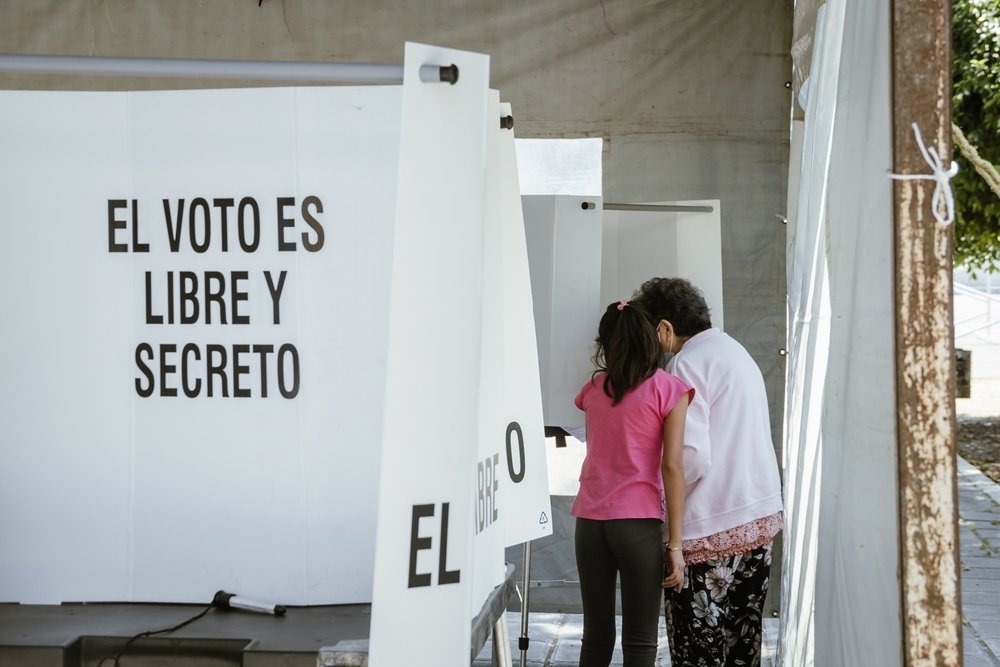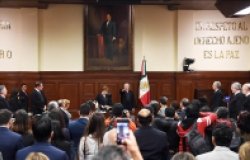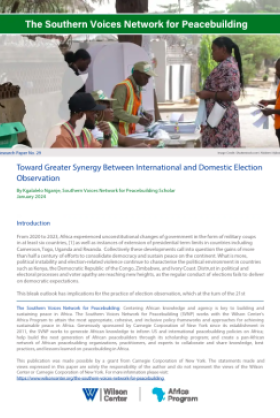Important Things Happening in Mexico Deserve Close US Attention

Alejandro_Munoz/Shutterstock.com
On June 2, Mexicans will choose a new president, a new congress, and many thousands of state and local officials in Mexico’s largest election ever.
At present, polls show a large advantage to Claudia Sheinbaum, the presidential candidate supported by incumbent President Andres Manuel Lopez Obrador (AMLO), over her principle rival, Xochitl Galvez, who heads the opposition coalition ticket.
Beyond the presidential race, the outcomes in congressional and state elections will have big implications for the political clout of Mexico’s new president, the temperature of political debates, and the potential for approving major reforms of Mexico’s institutions, championed by AMLO to further his vision of Mexico’s transformation.
As elections approach, analysts in Mexico, the US, and internationally have expressed serious concern about the strength of Mexico’s democracy and the potential negative impact of AMLO’s proposed reforms.
Given the closely interconnected relationship between Mexico and the United States, Americans must pay close attention to the outcomes Mexico’s elections and what follows. The US needs good working relations with its southern neighbor to deal with migration, crime and trade issues.
Given that the newly legislature takes office on September 1, AMLO is hoping that his allies will win a 2/3 majority in both houses of Congress in June, allowing him to win passage of his proposed constitutional and legal reforms before he leaves office on October 1. The proposals would significantly alter the workings of Mexico’s electoral authorities, congress, judiciary, and independent regulatory institutions, among other institutions. The thrust of the reforms as proposed would centralize more power in the executive branch and the presidency. However, there is significant opposition to several proposals, including some that previously spurred mass protests. It is far from clear what may result.
What happens in Mexico is vital for the US. US-Mexico ties touch the daily lives of more Americans than any other country in the world. Mexico is the US’s largest trade and co-production partner, supporting some 5 million US jobs. Most irregular migration crosses the US-Mexican border. Mexico remain the largest single source of US migrants and the source of family and cultural ties for over 35 million US citizens. Importantly, the vast majority of the deadly fentanyl fueling US overdose deaths comes thru Mexico.
The US-Mexico relationship is simultaneously domestic and international for both countries. There is much to gain by good cooperation, but the policies and politics of both countries often spur tensions and discord. It takes strong political commitment and skillful management to sustain good collaboration.
Of great concern is that the quality of Mexico’s democracy and governance has been declining, according to a variety of reports that compare countries around the world. This alarming trend gets too little attention.
Mexico faces daunting challenges in building prosperity and assuring rule of law. Regular news reports of criminal violence and thriving cartel power underscore this. Mexico has had more homicides during the current presidential administration than during any other presidential term in recent decades. Mexico is ranked as having the third worst criminality score globally, with extortion and other crimes deepening. A key study notes that despite improvements, Mexico was substantially less peaceful in 2023 than it was in 2015. Significant violence mars the ongoing election campaign. Many worry about organized crime shaping local elections.
Respected international studies put Mexico’s democracy in a broader perspective.
The Bertelsmann Transformation Index, covering some 130 countries, shows Mexico dropping in its scores between 2016 to 2024. It argues that Mexico is “currently on a path of de-democratization”. It cites attacks on independent institutions and a significant decline in Mexico’s rule of law and governance scores, among other concerns.
The Economist Intelligence Unit’s Democracy Index 2023 ranks Mexico 90th out of the 167 countries it studied. This index categorizes Mexico as a “hybrid” democracy, which falls below a “full” or a “flawed” democracy. It finds Mexico’s ranking dropped 15% since 2018 and highlights the numbers of civilian deaths related to criminal violence.
International IDEA’s Global State of Democracy Indices, which cover 173 countries, finds that since 2018 Mexico has declined in 12 of the 22 indicators it uses for assessing countries. The biggest declines are in parliamentary effectiveness, freedom of speech, press freedom, judicial independence, predictable enforcement, and strength of civil society.
The Varieties of Democracy (V-Dem) Democracy Reports, which cover 202 countries, find a notable decline in Mexico’s ratings for all of its indexes, and shows particularly large drops in Mexico’s scores for “deliberative democracy”, “liberal democracy,” and “electoral democracy”. V-Dem cites attacks on judicial and electoral institutions, false government information, and increased polarization, among other issues.
Freedom House’s latest Freedom in the World report, rating some 195 countries, characterizes Mexico as “partly free.” It describes a decline in freedoms beginning after 2017 and flags concerns with organized crime and violence, corruption, lack of government transparency, poor rule of law, and civil liberties more broadly.
The World Justice Project’s Rule of Law Index finds that Mexico’s rule of law scores declined notably between 2018 and 2023 among the 100 plus countries analyzed, with particularly bad ratings on corruption, security, and criminal justice performance.
The World Bank prepares Worldwide Governance Indicators covering over 200 countries and territories. The data from 2012, 2017 and 2022 show Mexico’s percentile rank declined in every category over the ten years, with the largest drops in government effectiveness, regulatory quality, rule of law, and control of corruption.
Finally, a 2023 Pew survey of 24 countries also flashed warning on Mexico’s democracy. The Pew survey showed that support for a leader making decisions without interference from a parliament or court had grown more in Mexico than in any other country studied (rising 23% to 50% of those polled).
The key point: it is essential understand Mexico’s current election cycle in the context of the serious concerns raised by expert studies examining democracy and governance around the globe. These echo Mexico-focused analyses by commentators and organizations about violation of human rights and civil liberties, attacks on individuals and NGOs that criticize the government, and violence against journalists and activists.
Mexicans have the most at stake, but next in line is the United States. The US is invested heavily in US-Mexico ties, including with a major trade agreement and a massive presence of US companies. Mexico and the US have set up regular meetings to address difficult issues. This process has produced good dialogue on trade, closer collaboration on migration, and improved but far from satisfactory cooperation on public security and drug trafficking.
The bottom line is that we all need to pay closer attention to the results of Mexico’s June 2 elections and their aftermath. If AMLO’s preferred presidential candidate and his party win 2/3 of Congress, we can expect to see an effort to amend Mexico’s constitution in ways that analysts warn would further weaken the independence of Mexico’s courts and rule of law, its electoral authorities, other independent regulatory bodies, and the participation of smaller parties in Congress, concentrating more power in the executive branch. The scenarios will build from the actual election outcomes.
A constant will remain, however: the United States and Mexico are profoundly intertwined. The US will be better off with a strong, democratic Mexican partner to help strengthen prosperity and security, just as Mexico needs a strong partner in the US. Both countries need to understand the trends shaping electoral outcomes on the other side of the border and engage each other to forge as constructive a partnership as possible. This will bring better outcomes for Americans and Mexicans.
About the Author

Earl Anthony Wayne
Former Career Ambassador to Afghanistan, Argentina, and Mexico; Distinguished Diplomat in Residence, School of International Service, American University

Mexico Institute
The Mexico Institute seeks to improve understanding, communication, and cooperation between Mexico and the United States by promoting original research, encouraging public discussion, and proposing policy options for enhancing the bilateral relationship. A binational Advisory Board, chaired by Luis Téllez and Earl Anthony Wayne, oversees the work of the Mexico Institute. Read more













